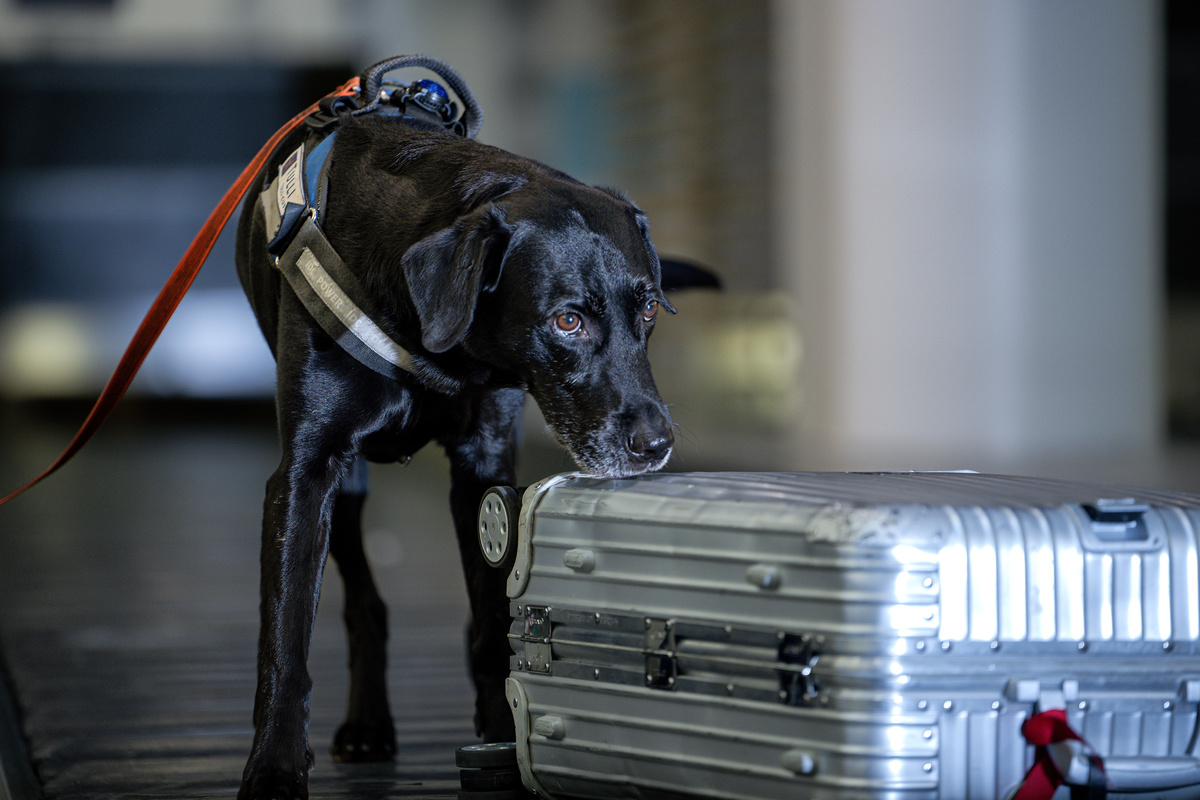Customs dogs support enforcement
Finnish Customs’ dog activities are productive official activities that protect society in passenger and goods traffic. Customs dogs help enforce prohibitions and restrictions on goods transported by land, air and sea. Finnish Customs has trained and used dogs since 1969.
Dogs have an unparalleled sense of smell. While a human’s sense of smell can detect smells within one square metre, a dog can detect different smells in an area the size of a football pitch. Most Customs dogs are trained to detect drugs, while some are trained to search for cigarettes, snuff, cash, weapons, explosives, and foodstuffs of animal origin.
- A drug dog’s most important job is to expose and prevent crimes involving the import, export and transit of drugs in the flows of passenger and goods traffic.
- Cigarette and snuff dogs look for large batches of cigarettes or snuff in commercial goods traffic.
- Money dogs help to combat the grey economy by searching for large amounts of cash in passenger and goods traffic, among other things.
- Dogs with weapon and explosives training identify weapons, weapon parts, ammunition, explosives and precursors in mail, air passenger baggage and air cargo.
- Food dogs are trained to find foods of animal origin, which could spread African swine fever in Finland.
These dogs may work at harbours, airports, lorry and car searches, small boats, warehouses, passenger terminals, outdoors, and with all possible equipment and locations where products can be smuggled or stored. If you encounter Customs dogs at work, please leave them to get on with their jobs. The public can meet and pet Customs dogs at various events and school visits.
Training
Customs dogs are trained through play. A dog’s training begins at the age of about seven weeks. At this point, the dog is with a handler, breeder or student of kennel work who socialises the animal, conducts environmental exercises and familiarises it with the work environment. The puppy undergoes one week of tests at the age of six months to gauge its nature and trainability. The test is designed to screen out unsuitable animals and steer the handler’s work towards preparing the dog for actual training when it is one year old.
The course planning and composition depend on the work partner’s skills and professional expertise and the environments where the dog will work. It must be able to work in areas with crowds, noise, strong smells and limited space. The training involves practical exercises in every possible working environment so the dog becomes accustomed to working in environments other than its normal place of work.
Working dogs undergo annual level tests, during which they learn new things and review what they have already been trained on. The tests are also an opportunity to correct any wrong actions and practise searching for contraband in genuine working environments. Dogs also have annual health checks at the same time as the level tests. The dog and its handlers continue training until the dog’s retirement.
Project dogs
Finnish Custom’s project dog operations maintain a small reserve of growing dogs in case of sudden illnesses, accidents and other unforeseeable situations. It normally takes about 18 months to acquire, raise and train the successors of working Customs dogs.
Finnish Customs acquires and owns project puppies in the normal way. However, a breeder or an educational institute in the kennel sector takes responsibility for raising and training the dogs until they are about 1 year old. The dogs spend their first year of life in an educational institute or with a breeder and enjoy a normal pup’s life while also receiving training adapted to their development stage and future job. At around one year of age, the dog is handed over to a Finnish Customs dog handler to begin special search training.
The Finnish government awards budgetary funding for customs dog activities. Finnish Customs does not collect donations to support its customs dog operations. However, charitable organisations may support the customs dog activities by donating money if they wish to do so. Individuals can also bequeath their property in their wills.
Monetary donations to Customs dogs are used entirely for Finnish Customs’ dog activities. We do not accept donations pertaining to goods, dog food or wellness services. Donors do not receive anything in return for their donations.
Where can I meet a customs dog?
Customs dogs are goodwill ambassadors and important officials of Finnish Customs. You will see them at border crossings, but you may also meet them at Finnish Customs’ trade fair booths and at other events.
You can follow the latest news on customs dogs on the Finnish Customs Facebook page and on this site.
For more information, please contact Finnish Customs’ communications, viestinta@tulli.fi
